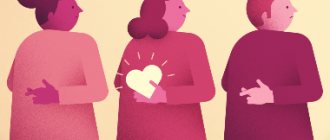Do you think there is a difference between the same person in adolescence and in old age? The appearance can be completely different, and an adult has much more life experience. But in terms of character, they are the same person. So, at least, scientists thought for a very long time. When they conducted studies in which they monitored the changes in people's personalities as they grew older, it turned out that people's temperaments remained virtually unchanged. If a person was aggressive as a teenager, this trait remained with him even at the age of 30. But recently scientists have found that people change a lot as they get older. Let’s say, if at the age of 60 you get into a time machine and meet yourself in your youth, you won’t even recognize him. But why did scientists even come to this conclusion?
People's personalities do change as they age, but it happens slowly.
General information
If you are interested in the question “does a person change throughout life?”, then the answer is yes. First of all, this includes age-related changes in character. So, over time, a person gets rid of childhood qualities, such as irresponsibility, self-centeredness, capriciousness, acquiring as he grows up such traits as tolerance, reasonableness, responsibility and prudence. Undoubtedly, there are exceptions to the rules, for example, the infantilism of an adult man.
Despite the fact that at the end of childhood, most personalities have a formed character, it can undergo changes as they grow older.
- First of all, there is no ideal character. Consequently, any individual may desire improvements, getting rid of negative traits, acquiring new, positive qualities.
- As you grow older, you accumulate experience that leaves an imprint on your personality. As life experiences develop, a person’s point of view on current events changes, which also affects her way of thinking and lifestyle.
- Faced with various life situations and circumstances, a person is forced to act in a new way, developing hitherto non-existent traits.
- Changes in character are determined by the individual uniqueness of the individual. May be based on the development of professional or personal life.
- A change in the position of an individual in society, a change in his social status also leaves a mark on a person’s fate.
Temperament is what we are born with
This is our biological characteristic. We cannot consciously influence it much more than we can influence the size of our heart.
Temperament determines a person’s emotionality, the speed of his mental processes, the dynamic properties of a person - for example, strength, pace, speed of reaction to various phenomena and events. It is important to understand that temperament rather characterizes the general way and direction of a person’s interaction with the world. It influences how we react to various events and what emotional habits we have.
Words with which we describe temperament: phlegmatic, melancholic, choleric, sanguine (according to the names of the 4 main types of temperament), as well as mobile, impetuous, calm, balanced, excitable, energetic, sensitive, hot-tempered.
Temperament serves as the basis for character development, but does not at all predetermine it.
Failure to manage your temperament can lead to health problems - overly impressionable people who are unable to soften their natural excitability with the habit of prudence are more susceptible to stress than people with a calm temperament. A striking literary example of an extremely phlegmatic person, capable of overcoming any adversity in life without much emotional loss, is Major McNabbs from Jules Verne’s book “The Children of Captain Grant.”
Possible reasons for change
Having suffered a serious illness, as well as a serious illness of a loved one, can greatly affect changes in personality
Psychology considers a number of factors that can influence a person, changing his usual way of life, his character, type of worldview, and personal attitudes. The most common reasons include:
- Severe mental shock. It can be both negative and positive. For example, the death of a loved one or the birth of a child.
- Having spiritual growth. A person gradually improves, daily learns about the world around him, and develops his consciousness. People who are nearby may not notice the changes that occur. As for acquaintances with whom there has been no contact for a long period, when they meet a changed person, they will immediately notice the changes that have occurred. This includes the accumulated experience that changes a person, distinguishes what he was like 10 years ago and now. After all, mistakes made and acquired wisdom allow you to look at the world around you in a new way. However, not everyone changes with age. This is due to the presence or absence of the ability to evaluate the path traveled.
- The impact of life circumstances. For example, an individual who has served time in prison can change, both for the worse and for the better. Changing jobs, moving to a new city, all this can affect a person. Finding himself in the company of self-sufficient individuals, the individual begins to change unnoticed by himself, improving his qualities. However, some people, even in the presence of such factors, adapt to environmental changes, remaining unchanged.
- Finance is a driver of change, both negative and positive. So, for example, a person with a closed soul, having received a large amount of money, can spend it left and right, allocate considerable sums to charity, and not regret anything. And the previously good-natured, open personality withdraws from the world around him.
- The age crisis can leave its mark. Between thirty and forty years, there is often a lack of perfect plans that were previously outlined. A person reconsiders his views, sometimes he can change his way of existence, some qualities can strengthen and become stronger, while others can weaken. Liberation from illusions occurs. Crisis of old age (age over 70 years) - a person analyzes his past, reevaluates himself, notes positive and negative moments in his life. If everything suits him, he understands that he has the right character traits. If he becomes aware of the lack of some qualities, he tries to change himself. At this age, changes are often caused by the loss of loved ones or loneliness.
- The presence of a protracted illness forces you to change your usual lifestyle for a long period of time. And a disease that threatens death forces you to reconsider your entire life path. Often a person changes under the influence of his approaching death, even if he managed to avoid it.
Unchangeable Foundation
Previously, it was believed that a person’s character was fully formed in childhood and matured, at the latest, by the age of 30. But it appears to retain, as the study authors put it, “fluidity and malleability.”
“As people get older, they become more pleasant,” says Rene Mottus. “They are more aligning their life expectations with the demands of society.”
So what does character formation depend on? For example, nervous excitability generally decreases, but the person who was the most neurotic among his peers at 11 years old will still remain the most neurotic among 81-year-olds.
“Human character is not set in stone and can change, but there is a certain basis that distinguishes one person from the rest,” says Rodica Damian, a social psychologist at the University of Houston . Since personality maturation as a whole is universal, a number of experts consider it genetically programmed, perhaps even formed during evolution.
“I think this is quite understandable, and the older a person is, the faster he changes,” says Rene Mottus.
What will a person’s drawings tell you? Infographics Read more
Making adjustments to our life
A person can change for the better by ridding himself of negative qualities
A person may have certain character traits that he would like to get rid of, which prevent him from living fully. In such a situation, maximum efforts must be made to bring about change. Let's look at what shortcomings should definitely be eliminated and how to do it.
- Complete dependence on the opinion of another person. It is necessary to understand that this phenomenon also affects the development of low self-esteem. Your task is to change your opinion about yourself, identify your positive qualities, concentrate on them, come to terms with shortcomings if they cannot be corrected, learn to live, relying, first of all, on your instincts and your ideas.
- Fear of failure. This quality hinders the full development of personality and interferes with self-realization. In such a situation, it is unlikely that you will be able to cope with the phobia on your own. It is better to seek help from a professional psychologist, who will not only relieve you of this fear, but also add self-confidence.
- A tendency to depression often affects personality changes in a negative direction. It is important that in the life of every person there is motivation that would allow him to move forward. You need to understand that on the path of life there can be not only black stripes, but also white ones; the sun always comes out after the rain. You need to look for positive moments in every situation, learn to enjoy every day, set goals for yourself, and strive to achieve them.
We have considered only three qualities that can hinder success, career growth, and personal happiness. In fact, there are many more of them. Your task is to understand that a person needs to change if his shortcomings interfere with a full life.
Now you know the answer to the question “do people change over time?” In fact, changes occur in the life of every person. But for some they are expressed more clearly, for others they are almost invisible. In addition, it is worth considering the fact that people who are constantly nearby practically do not notice changes in your personality, unless they are drastic. Whereas a person with whom there has been no contact for a long period of time will immediately notice the changes that have occurred.
What is character
Is it possible to change your character? Most experts believe that this is impossible. This is not entirely true. Any person can change his character and, thereby, change his life. But this is not an easy process that requires maximum responsibility, preparation and a clear action plan.
It is much easier to change your behavior in a specific situation. Let's say that a person is unrestrained and in anger can yell at anyone, be it a dog, an acquaintance or a boss. Learning to react calmly in conflict situations will be easier than excessive emotionality in life, which can manifest itself not only in hot temper, but also in uncontrollable positive outbursts. Few people will like the hugs and kisses of a stranger when he finds out about a promotion and, from an overabundance of feelings, shares his joy with others.
In essence, character is habits, behavior, a stable way of thinking and reacting in various situations. All this is adjustable. Character is not a rigid system that cannot be reconfigured. It simply determines the tendency to act in one way or another.
Narcissistic Personalities
Due to difficulties in expressing feelings, coldness towards others and a desire to control everything, people of this type often remain lonely in old age. They do not tolerate changes in appearance and body well, they do not want to feel weak and dependent, they envy the younger generation, so they actively put a spoke in their wheels. They need a sense of power and authority, hold on to their position to the last, humiliate the weak, and take it out on loved ones. At the end of the journey they remain abandoned by everyone due to their uncooperative character.
Obsessive-compulsive personalities
By the type of aging they resemble paranoids with a slight difference - they are extremely disciplined, live according to a clear schedule, try to direct all their efforts to maintaining order and cleanliness in the house, daily polishing all surfaces until they shine. It is difficult for them to part with things that have outlived their usefulness - they collect old junk, carefully protecting the past. They may be afraid of persecution and deception, they suffer if circumstances force them to change the situation and the usual rhythm of life, they want to control everything.
As you can see, each personality type has its own characteristics that you need to learn to cope with if you don’t want them to take over you in old age. Keeping your body toned, introducing healthy eating habits, and never stop learning new things will help you stave off your insanity.
Depressed people
People prone to depression are often unprepared for aging and decline in their capabilities, which makes them feel inferior and unworthy of love. They may regret their lost youth and feel guilty for what they never did. The latter leads to two reactions: introverts isolate themselves from others, punishing themselves for the past; extroverts protect themselves from emptiness by the mechanism of overcompensation - excessive activity in social life, joining religion, volunteering. “Since I can’t help myself, I need to help others.” It is difficult to cope with the loss of loved ones - they quickly fall ill and leave behind.
Schizoids
They belong to the most problem-free type of old people - schizoid individuals look forward to retirement as a holiday, and easily tolerate age-related complications and a narrowing of their social circle. Initially, they are not prone to emotional involvement in relationships, they are comfortable alone with themselves and their thoughts, they do not need friends, frequent calls and visits from relatives, they do not care about self-realization in life. In retirement, they prefer to sit at home or in a quiet, secluded place; they calmly accept the loss of a spouse, the death of old acquaintances: “Finally, everyone will leave me alone!” The only source of stress for them is the need to go to grocery stores or the hospital, move to a new place, or live in an area with large crowds of people (communal apartments, nursing home).










